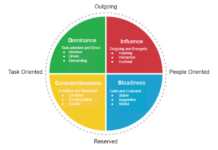
No matter how charming you are, not every conversation you partake in is going to be a pleasure.
Now, this means one of two things. First, it means that you might not enjoy the people you are talking to. This happens frequently.
Second, and more importantly, it means that some of your conversations are by nature difficult, awkward, and confrontational. When you need to talk to you co-worker about how she talks too much, or to your girlfriend about how you need more space when you’re with your friends – these are not easy conversations for anyone.
You know what you want to say, and you know the message you want to convey, but there are so many possible missteps when emotions and confrontation are involved. People become defensive, hurt, and feel judged. And thus passive aggressive behavior and avoidance is fanned into a relationship.
So how can you avoid these pitfalls and make sure that your difficult conversations are as painless as possible?
1. Find The Third Story
The inherent assumption here is that both parties are wrong and have miscommunicated, and you are simply searching for where that disconnect occurred. You’re aproblem solver, not a blamer.
The third story is the explanation that accounts for why one party is hurt or displeased and all the factors that each party contributed to it.
Pretend there is a third person in the room and imagine what they would say? What would a judge or mediator come up with based on the evidence presented by both sides?
The third story integrates elements of both stories, but casts no blame on either party. It just creates reasons to account for the reactions that each party has had. In this way, you are never 100% correct and you are always 1% at fault.
2. Assume Good Intentions
Start difficult conversations with an assumption of positive, or at least neutral intentions in the fact of negative impact. At worst, assume ignorance and carelessness than intentional evil or malice. The former hurt far less.
This will diffuse the negative thoughts spiraling in your mind and help you focus on the facts of the situation so you can come up with a more objective verdict.
It’s easy to jump to the conclusion that the person who did you wrong is a no-good, worthless, evil, and malicious person. But it’s going to set back your ability to establish a difficult conversation on a solid foundation of mutual respect and emotional validation.
To put your emotional state at the right place when you’re trying to get a difficult conversation going, assume at best ignorance and carelessness instead of malice.
3. Create Safety
Suppose you have a friend that you tell your dating stories to. He or she fails to see the humor in your failed dates and furthermore doesn’t think that pre-marital dating should exist in any form. He or she believes that you should marry the first person you kiss.
When he or she eventually makes these beliefs apparent to you, do you think you’re going to keep telling him or her your dating stories? No chance.
You’d stop immediately because you would know that with every sentence, your so-called friend is judging you and mentally labeling you. They’ve eliminated the space for you to be vulnerable and you don’t feel safe sharing with them anymore.
The same situation plays out with difficult conversations. In order for people to open up to you, or you to them, there must be a sphere of safety wherein the parties don’t feel judged for expressing their thoughts or emotions. They need to be able to let their guard down for extended periods of time, and they won’t do that unless there is guaranteed safety.
4. Understand Ego
Being confronted in a difficult conversation puts people into “fight or flight” mode. They aren’t often able to run away, so they’re in fight mode and have to protect themselves from danger. There’s no physical danger, so what they are most eager to protect is the ego and their sense of pride and self-worth.
You can additionally understand people based on how they counterattack. It can reveal the type of insecurity they have that you’ve unintentionally uncovered. People are usually operating from a stance of fear and prevention.
For example, narcissistic defensive people appear to have an unconscious and extreme fear of being found inferior. Similarly, they don’t like feeling helpless. This pushes them to take extreme efforts to overcome insecurity. How do they do this? They try to project an air of superiority by insulting and demeaning others. They try to drag you down to their level.
Understand where people are coming from and why they react the way they do to get what you want out of a difficult conversation.
Click here to pick up my new book on difficult conversations – Conversation Tactics: Strategies to Confront, Challenge, & Resolve – Difficult Conversations Made Painless.





